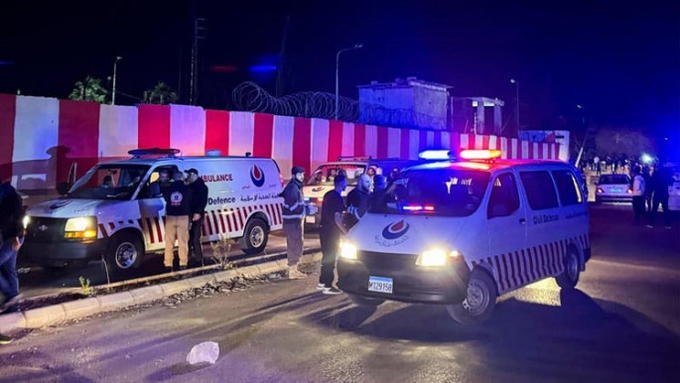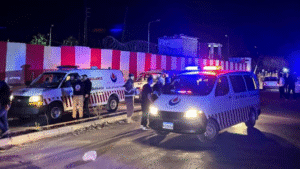At least 13 people were killed in an Israeli drone strike on the Ein el-Hilweh Palestinian refugee camp near Sidon in southern Lebanon on Tuesday, the Lebanese Ministry of Public Health confirmed.
The drone strike hit a car in the parking area of a mosque inside the Ein el-Hilweh refugee camp on the outskirts of Sidon, leaving at least four others wounded, and the ministry said ambulances were still transporting casualties to nearby hospitals.
The Israeli military claimed it had struck Hamas members operating inside what it described as a training compound in the camp, asserting that “we will not tolerate any threat on our northern border” and that it would “continue to act forcefully against Hamas’s attempts to establish a foothold in Lebanon.”
Hamas rejected the Israeli account, calling it a “fabrication” and insisting that it has no training facilities in Lebanon’s refugee camps.
“The claims and allegations of the Zionist occupation army that the targeted location was a ‘training compound belonging to the [Hamas] Movement’ are sheer lies, aimed at justifying its criminal aggression and inciting against the refugee camps and our Palestinian people. There are no military facilities in the Palestinian refugee camps in Lebanon,” Hamas said.
The movement described the strike as a “brutal assault” against “defenseless Palestinian people and on Lebanese sovereignty.”
Earlier on Tuesday, Lebanese authorities reported that separate Israeli strikes on vehicles in the country’s south killed two more people.
Meanwhile, on Wednesday injuries were also reported, including among schoolchildren, after Israeli occupation forces bombed a vehicle in the southern Lebanese town of Al-Tayri.
The attack came only days after UNIFIL peacekeepers were fired upon by an Israeli Merkava tank near an Israeli position established inside Lebanese territory.
According to UNIFIL, heavy machine-gun rounds landed just five metres from peacekeepers on foot, forcing them to take cover. The mission described the incident as a “serious violation” of UN Security Council Resolution 1701.
The Ein el-Hilweh camp, home to thousands of Palestinian refugees displaced since the 1948 Nakba, has once again been engulfed in grief.
Palestinian activist Yara noted that “ceasefires do not protect Palestinians and Lebanese from ongoing Israeli attacks,” adding that violence has continued relentlessly despite formal pauses in fighting. Since the war began in October 2023, Israel has killed several officials from Palestinian factions in Lebanon.
The air strike comes amid Israel’s broader campaign against Palestinian communities across the region.
Following Israel’s declaration of war on Gaza, Hezbollah began firing rockets into northern Israel, which responded with air strikes and shelling across southern Lebanon.
The clashes escalated into a full-scale war in late September 2024 and subsided only after the U.S.-brokered ceasefire in late November 2024.
Despite the ceasefire, Israel has carried out dozens of airstrikes, claiming Hezbollah is trying to rebuild its military capabilities. Lebanon’s Health Ministry says more than 270 people have been killed and around 850 wounded in Israeli attacks since the ceasefire.
Over the course of the wider conflict, Israel’s war on Lebanon killed more than 4,000 people, including hundreds of civilians, while 127 people, including 80 soldiers, were killed in Israel.
Israel’s assault on Gaza since October 7 has killed at least 69,483 Palestinians and wounded 170,706, with many victims still under the rubble.
Journalist Shameen Suleman highlighted the human toll on the refugee population, saying that Ain al-Hilweh, though located on Lebanese land, is a densely packed Palestinian camp where displacement has persisted since 1948.
“Any strike there is guaranteed to kill civilians,” she said, adding that Israel, after devastating Gaza, “is now hitting Palestinian communities outside Gaza as well. The borders change; the targeting of Palestinian life does not.”
The post At least 13 killed in Israeli strike on Palestinian refugee camp in Lebanon appeared first on Maktoob media.










